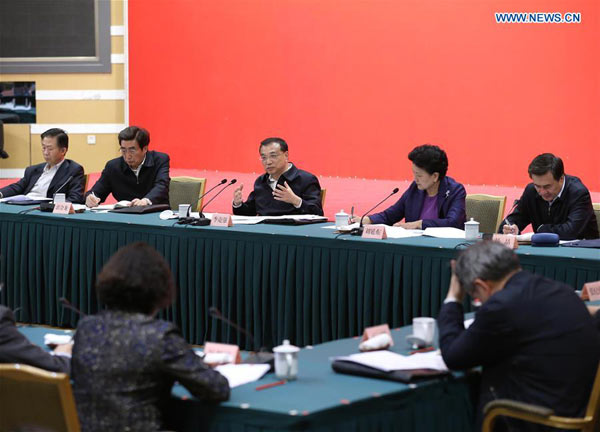Education to boost growth in central, western areas
(China Daily) Updated: 2016-05-07 09:24
 |
|
Chinese Premier Li Keqiang (back C) speaks at a symposium on innovation for higher education in Beijing, capital of China, April 15, 2016. [Photo/Xinhua] |
Editor's Note: At an executive meeting late last month, the State Council, China's Cabinet, laid out policies to expedite the development of and promote equality in education in the central and western regions, in order to strengthen the foundation of social development. Following are opinions of some media outlets:
Xinhuanet.com:
Compared with China's developed coastal region, its vast central and western regions lag behind in terms of education development. The State Council's move to improve education standards in the less-developed regions, therefore, is a big step toward ensuring even distribution of education resources and promoting social equality and justice. The policies and measures adopted by the Cabinet will also greatly help eradicate poverty and build a well-off society in an all-round way.
The policies and measures are targeted at curing the symptoms responsible for the sub-par education standards in the regions, such as poor conditions of schools, and substandard teaching facilities and teachers. Improvements will be made at every stage and aspect of education, from building universities and colleges to encouraging ethnic minorities and the physically challenged to embrace higher studies.
The concrete measures will include improving teaching methods and books, providing better meals and heating conditions in boarding schools, exempting students from poor families from paying miscellaneous fees and raising the enrollment rate in senior high schools to more than 90 percent.
The social role of education is not only to foster talents for future development, but also to help alleviate poverty. Measures such as those aimed at promoting cooperation among different schools and strengthening training and popularizing the modern apprenticeship system will serve this purpose.
Given that education is closely related to cultivation of talents, generating employment and innovation, and promoting fairness, the government should not delay efforts to bridge the education gap between central and western regions and the rest of the country.
GMW.cn:
Education can change people's fate, it can also boost a region's economic, cultural and social development. This explains why the government attaches so much importance to improving education standards in the central and western regions and has adopted policies and measures to fund and support talent, and bridge the education gap between the regions and the rest of China.
Promoting equality in education, strengthening its foundation and improving people's livelihoods are the only way the central and western regions can be lifted out of poverty. These measures will also help build a well-off society in an all-round way.
A series of policies and measures adopted by the State Council, such as reasonable distribution of schools, and increasing and improving teachers and facilities, especially in rural areas of the central and western regions, will help promote balanced development of compulsory education and facilitate the even distribution of education resources.
Thanks to the support of the central government, the efforts of local governments and the devotion and commitment of the huge number of people working in the education sector, education is set to greatly improve in the central and western regions.
21st Century Business Herald:
Apart from the policies and measures aimed at promoting the even development of academic and vocational education, the State Council has also listed increasing the supply of education resources to the central and western regions as a key task. The creation of more teaching posts in rural areas, exemption of tuition fees for children of poor families and increased efforts to cultivate teachers for rural areas will also facilitate the even development of education in urban and rural areas.
Moreover, the adoption of practical measures to develop vocational education, increase enrollment in such schools and urge enterprises to support them will improve the conditions for the transfer of industries from the coastal region to the central and western regions, which in turn will promote local economic development.

I’ve lived in China for quite a considerable time including my graduate school years, travelled and worked in a few cities and still choose my destination taking into consideration the density of smog or PM2.5 particulate matter in the region.











